Reviews
Bill Rebane
USA, 1975
Credits
Review by Thomas Scalzo
Posted on 14 October 2012
Source Retro Media DVD
Categories 31 Days of Horror IX
Bill Rebane: if you know him, you know The Giant Spider Invasion. And if you know The Giant Spider Invasion, you most likely know the Mystery Science Theatre 3000 version, with its running commentary of good-natured mocking. While it’s certainly true that Rebane’s work, Spider Invasion in particular, is a treasure trove of ridicule-friendly horror, the man should not be dismissed as a mindless moviemaking hack. He may have routinely lacked for funds, but a thorough examination of his output shows a man with an obvious fascination with fantastic tales, and a fierce determination to bring those tales to life. Whether that determination led to relying on hokey special effects or dialogue heavy screenplays, Rebane found a way, time and again, to tell his stories. And that’s what makes Rebane’s films resonate, despite their obvious shortcomings: they are his films. They are labors of love, filled with a charming purity that can only be achieved by an independent artist following his vision. On Sundays this month we’ll take a look at four features from this low-budget auteur from Wisconsin.
Looks like our black hole has turned into an open doorway to hell.
—Dr. Jenny Langer
At first glance, this raucous tale of gigantic arachnids traversing a black hole in order to wreak havoc on a small Wisconsin town appears to be little more than a goofy monster movie. The effects are slipshod, the acting is wildly uneven, the editing is jarring, and any film featuring a Volkswagen Beetle rigged to pass for a giant spider doesn’t make a strong case for viewer introspection. For those willing to peer behind the curtain, however, The Giant Spider Invasion ultimately reveals itself as a fundamentally pessimistic film, with very little positive commentary on the state of humanity. When compared with the almost nauseatingly optimistic closing scenes of Rebane’s similarly structured Invasion From Inner Earth, a film released less than two years prior, this attitude is quite surprising. Nevertheless, whether owing to the increased pressures of working with a bigger budget and recognizable actors, a creeping disillusionment with filmmaking in general, or factors unknown, Bill Rebane’s seminal creature feature endures as an intriguing paradox: at once his most popular and most disaffecting creation.
To begin to understand the subtleties of The Giant Spider Invasion, we must first examine the competing explanations as to why such a horrid fate has befallen the denizens of northern Wisconsin. To hear the scientists tell it, a black hole has somehow materialized in the nearby woods, allowing free passage to anything and everything residing in an adjacent dimension. Unfortunately, that dimension happens to be populated by giant, man-eating spiders. If a way can be found to neutralize the energy source keeping the black hole open, the rift in time and space will be closed, and the spiders will disappear. The local revivalist preacher, by contrast, has another explanation for the carnage: humanity has grown selfish and evil and God is mad. The black hole and the spiders are simply a modern manifestation of His wrath. The scientists can prattle on all they want about energy sources and multiple dimensions: until people change, terrors of one kind or another will continue.
Such biblical blustering could have been easily dismissed as a time-filling sideshow if the characters were as generally likable and respectable as the folks in Invasion From Inner Earth. However, unlike Invasion’s wholesome heroes, a significant number of the Spider Invasion natives are downright horrible. From Ev’s incessant boozing, to Kester’s unrepentant infidelity, to Terry and her snotty self-importance, we’re quickly made to understand that this is a town full of selfish, godless people. There are a select few non-detestable characters, including the pair of middle-aged scientists, and the jovial Alan “The Skipper” Hale as the local sheriff. However, mired as they are in detailing the ins and outs of the black hole situation, the scientists never get much chance to develop any real personalities. As for Hale, his defining characteristic is a penchant for horrid one-liners (“Geiger counter? We don’t have any Geigers around here, never did!”), a trait that keeps his character at a distance.
Thankfully, Rebane compensates for this depressing message and dearth of relatable characters with an action-packed climax that consumes nearly a third of the film’s runtime. Through a dizzying array of quick cuts to several scenes of simultaneous action, Rebane keeps up the frenzied pace, admirably instilling an energy into footage that doesn’t appear to be all that interesting on its own. From Kester in the fields digging up spider eggs, to Dave at the bar talking with Dutch, to the scientists driving frantically to the location of the black hole, to an aerial shot from the radiation-detecting helicopter, to the sheriff trying to control the vigilante justice mob, to streets filled with panicked citizens, and back again to Kester, we’re whisked time and again from location to location, character to character, in an admirable effort to keep us on our toes. All told, the final third of film consistently teeters on the edge of chaos, while a giant black spider routinely swings its goofy legs to and fro and slowly advances upon unsuspecting townsfolk.
Even though all this is quite fun, and a great ride while it lasts, as the film draws to its abrupt conclusion, we’re reminded again of the dark undercurrents at work. That we never have a chance to wind down after the ferocious spider battle and share a moment of quiet contemplation with relatable heroes serves to underscore the fact that there aren’t any characters worth remembering here. And if we set about comparing the ending of Spider Invasion to Inner Earth, we realize how substantially Rebane has shifted his tone between these two pictures. Whereas his earlier film concludes by offering its two remaining heroes a quiet, hopeful moment in which to assess the new world they are about to embark upon, here we have a desperate scene, filled with fire and smoke, overshadowed with Dr. Langer’s dire words, “they can come again.” That a brief scene of the preacher continuing his message of doom succeeds this dismal forecast only serves to bolster the argument that Rebane’s message here, despite ludicrous plot points and high-octane spider action, is a cynical one. Thus, it comes as some surprise that The Giant Spider Invasion, unlike the majority of Rebane’s endearing cinematic creations, ultimately leaves us cold.
More 31 Days of Horror IX
-
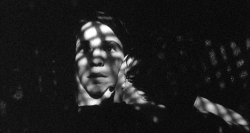
The Addiction
1995 -
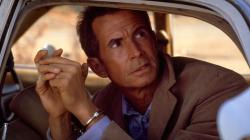
Psycho III
1986 -
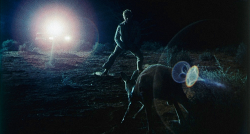
Wake in Fright
1971 -

Blacula
1972 -
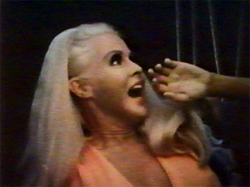
Big Foot
1970 -
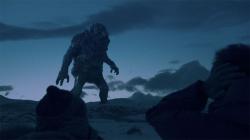
Trollhunter
2010 -
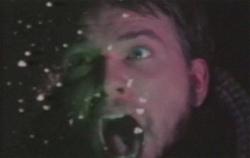
Invasion from Inner Earth
1974 -
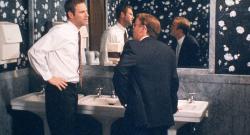
In the Company of Men
1997 -
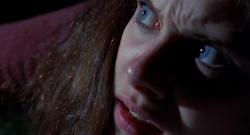
Happy Birthday to Me
1981 -

I Drink Your Blood
1970 -
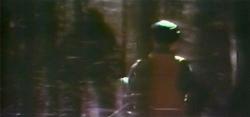
The Legend of Boggy Creek
1972 -
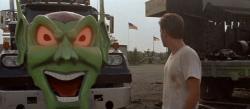
Maximum Overdrive
1986 -
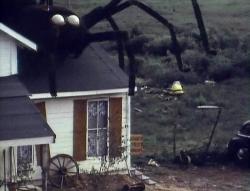
The Giant Spider Invasion
1975 -

Ganja & Hess
1973 -
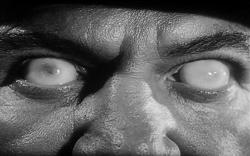
Not of This Earth
1957 -

Let’s Scare Jessica to Death
1971 -
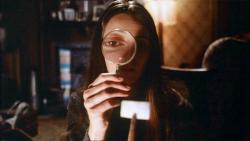
Next of Kin
1982 -
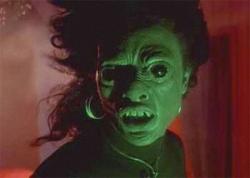
Def by Temptation
1990 -
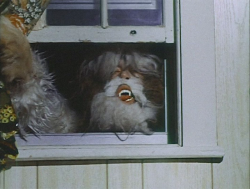
Shriek of the Mutilated
1974 -
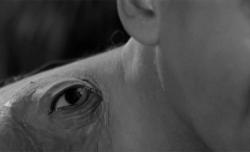
The Manster
1959 -
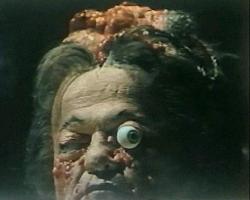
The Alpha Incident
1978 -

The Bride
1985 -
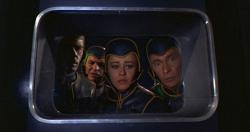
Planet of the Vampires
1965 -

The Hole
2009 -
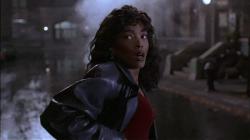
Vampire in Brooklyn
1995 -
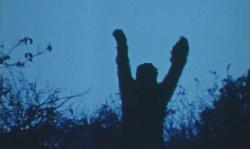
Sasquatch: the Legend of Bigfoot
1977 -

Mad Love
1935 -
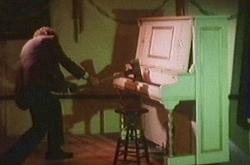
The Demons of Ludlow
1983 -

Habit
1997 -

Elephant
1989 -
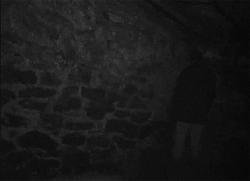
The Blair Witch Project
1999
We don’t do comments anymore, but you may contact us here or find us on Twitter or Facebook.



